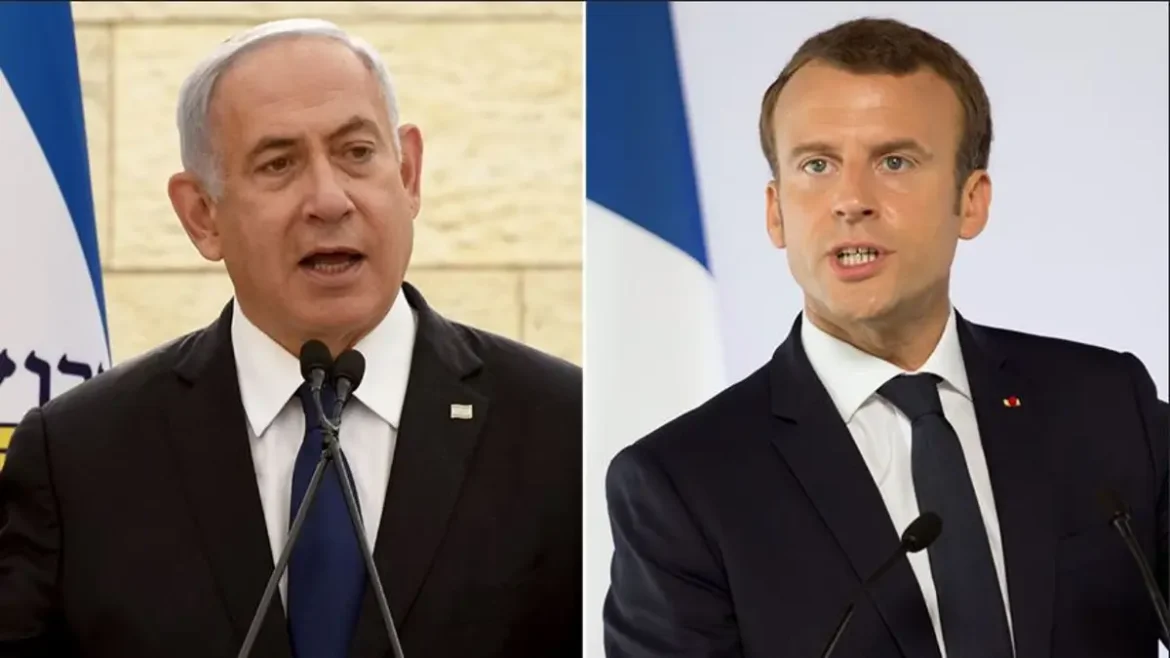Israeli Prime Minister Benjamin Netanyahu slammed French President Emmanuel Macron’s recent call to halt arms deliveries to Israel amid rising tensions in West Asia. The dispute has intensified, especially as Israel continues its conflict with the Iran-backed Hezbollah terrorist group. Netanyahu’s criticism, which came in a video statement on Sunday, labeled Macron’s stance as “shameful” and questioned the motives of Western leaders calling for an arms embargo on Israel.
Netanyahu’s remarks came after Macron, in an interview with France Inter, advocated for halting weapons supplies to Israel to facilitate a political solution in Gaza. “I think that today, the priority is that we return to a political situation, that we stop delivering weapons to Israel to fight in Gaza,” Macron said. His comments were met with immediate backlash from Israeli leadership, who viewed it as undermining their right to defend themselves against terror threats.
Netanyahu’s Sharp Response
The focus of Netanyahu’s critique was Macron’s decision to propose an arms embargo while Israel is engaged in an intense battle against Hezbollah and other militant groups backed by Iran. Netanyahu expressed deep frustration at what he perceives as a lack of support from Western nations, particularly France, in the ongoing conflict.
“As Israel fights the forces of barbarism led by Iran, all civilized countries should be standing firmly by Israel’s side. Yet President Macron and other Western leaders are now calling for arms embargoes against Israel,” Netanyahu said in his video statement. He went on to add, “Shame on them.”
Netanyahu also emphasized that Israel will persist in its fight for security and sovereignty, regardless of international decisions. “Israel will win with or without their support,” he affirmed, adding that it was hypocritical for countries that oppose terrorism to suggest cutting off arms supplies to Israel, while Iran continues to arm its proxies freely. “What a disgrace,” he stated, questioning why Iran’s weapons deliveries remain unchecked while Israel faces calls for an embargo.
France Defends Its Position
In response to Netanyahu’s comments, the office of French President Emmanuel Macron issued a statement reaffirming France’s commitment to Israel’s security. The Élysée Palace underscored that France remains Israel’s ally and has consistently supported the nation’s right to defend itself.
“France is Israel’s steadfast friend,” the statement read, emphasizing that Macron “supports Israel’s security and demonstrates it.” It also highlighted Macron’s conversation with Iranian President Ebrahim Raisi, where the French leader made it clear that France would not tolerate any attacks on Israel, whether by Iran or its proxies, and would stand against such aggression.
Despite the firm stance on security, the French President’s office also reiterated the need for a de-escalation of violence in Gaza, advocating for a ceasefire as the most immediate solution to prevent further loss of life and damage. “The President calls for an end to arms exports intended for use in Gaza,” the statement added, explaining that Macron’s stance is rooted in the belief that continued violence only deepens the crisis. However, it also acknowledged that Netanyahu’s words were seen as excessive and not reflective of the long-standing friendship between France and Israel.
Diplomatic Fallout
The diplomatic rift between Israel and France is the latest example of how the broader geopolitical conflict in West Asia is straining alliances. France, which has historically maintained a balanced relationship with both Israel and key Arab nations, finds itself in a precarious position as it seeks to support peace efforts without appearing to compromise its values or its relationships with allies. Macron’s call for halting arms shipments is seen by Israel as a concession to pressures from other nations and as undermining Israel’s ability to defend itself from existential threats.
Netanyahu, in his defense of Israel’s military actions, framed the conflict as one that goes beyond national borders. “In defending ourselves against this barbarism, Israel is defending civilization against those who seek to impose a dark age of fanaticism on all of us,” he stated. He reiterated that Israel’s fight is not only for its own security but for the security and stability of the region and the world.
Future of Israel-France Relations
The ongoing diplomatic spat raises questions about the future of the relationship between Israel and France. While the Élysée has been quick to downplay the tensions, reaffirming its long-standing alliance with Israel, the dispute highlights the complexities involved in balancing international diplomacy with the evolving security dynamics of the region. Macron’s office emphasized that while his words might have been misinterpreted, France’s actions consistently support Israel’s right to self-defense.
The controversy also underscores broader tensions in the West over how to approach the Israeli-Palestinian conflict and the region’s wider instability. As the people of Israel and surrounding nations continue to experience the consequences of violent conflict, leaders from both countries face mounting pressure to find solutions that balance defense with diplomacy.
As the situation unfolds, Netanyahu remains firm in his position, declaring that Israel will continue to fight until victory is achieved, with or without international support. However, the clash over ammunition deliveries and Macron’s call for an arms embargo could complicate future cooperation between the two nations, raising concerns about long-term strategic alliances in the region.
Stay connected to know more on arcnews.online for global news like Netanyahu Slams French President Over Halting Ammunition Deliveries. For videos updates visit our YouTube. Do subscribe to Arcnews to get latest updates directly in your mail box.
Have A Great Day.


